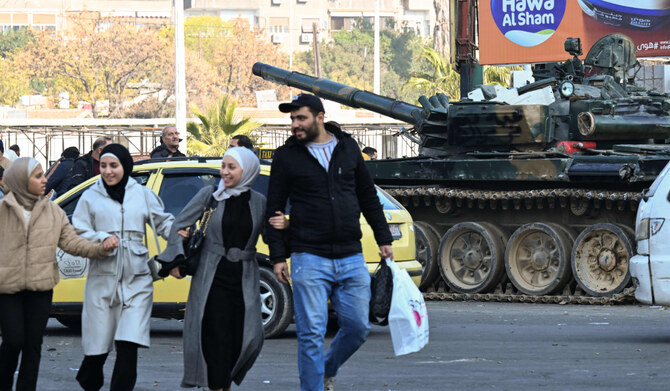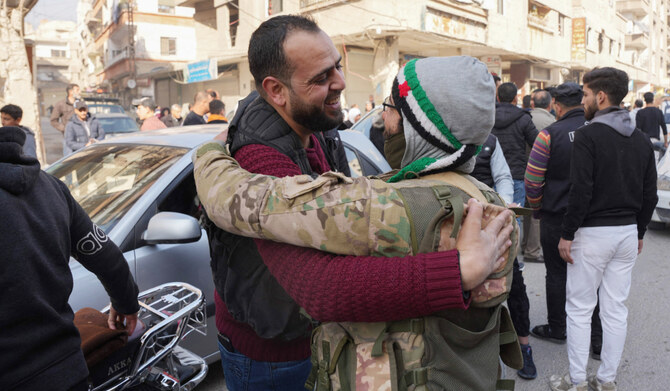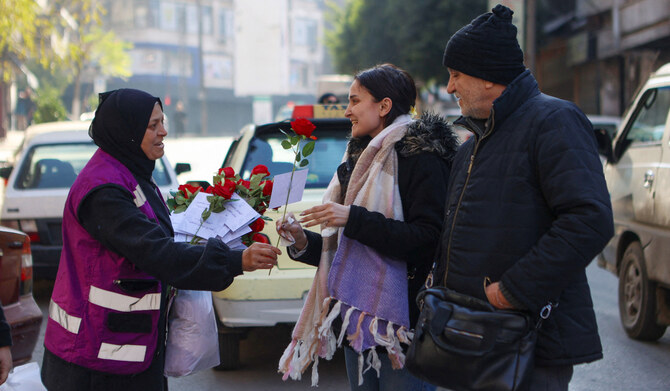TEL AVIV: The only times the Palestinian man wasn’t bound or blindfolded, he said, was when he was used by Israeli soldiers as their human shield.
Dressed in army fatigues with a camera fixed to his forehead, Ayman Abu Hamadan was forced into houses in the Gaza Strip to make sure they were clear of bombs and gunmen, he said. When one unit finished with him, he was passed to the next.
“They beat me and told me: ‘You have no other option; do this or we’ll kill you,’” the 36-year-old told The Associated Press, describing the 2-1/2 weeks he was held last summer by the Israeli military in northern Gaza.
Orders often came from the top, and at times nearly every platoon used a Palestinian to clear locations, said an Israeli officer, speaking on condition of anonymity for fear of reprisal.
Several Palestinians and soldiers told the AP that Israeli troops are systematically forcing Palestinians to act as human shields in Gaza, sending them into buildings and tunnels to check for explosives or militants. The dangerous practice has become ubiquitous during 19 months of war, they said.
In response to these allegations, Israel’s military says it strictly prohibits using civilians as shields — a practice it has long accused Hamas of using in Gaza. Israeli officials blame the militants for the civilian death toll in its offensive that has killed tens of thousands of Palestinians.
In a statement to the AP, the military said it also bans otherwise coercing civilians to participate in operations, and “all such orders are routinely emphasized to the forces.”
The military said it’s investigating several cases alleging that Palestinians were involved in missions, but wouldn’t provide details. It didn’t answer questions about the reach of the practice or any orders from commanding officers.
The AP spoke with seven Palestinians who described being used as shields in Gaza and the occupied West Bank and with two members of Israel’s military who said they engaged in the practice, which is prohibited by international law. Rights groups are ringing the alarm, saying it’s become standard procedure increasingly used in the war.
“These are not isolated accounts; they point to a systemic failure and a horrifying moral collapse,” said Nadav Weiman, executive director of Breaking the Silence — a whistleblower group of former Israeli soldiers that has collected testimonies about the practice from within the military. “Israel rightly condemns Hamas for using civilians as human shields, but our own soldiers describe doing the very same.”
Abu Hamadan said he was detained in August after being separated from his family, and soldiers told him he’d help with a “special mission.” He was forced, for 17 days, to search houses and inspect every hole in the ground for tunnels, he said.
Soldiers stood behind him and, once it was clear, entered the buildings to damage or destroy them, he said. He spent each night bound in a dark room, only to wake up and do it again.
The use of human shields ‘caught on like fire’
Rights groups say Israel has used Palestinians as shields in Gaza and the West Bank for decades. The Supreme Court outlawed the practice in 2005. But the groups continued to document violations.
Still, experts say this war is the first time in decades the practice — and the debate around it — has been so widespread.
The two Israeli soldiers who spoke to the AP — and a third who provided testimony to Breaking the Silence — said commanders were aware of the use of human shields and tolerated it, with some giving orders to do so. Some said it was referred to as the “mosquito protocol” and that Palestinians were also referred to as “wasps” and other dehumanizing terms.
The soldiers — who said they’re no longer serving in Gaza — said the practice sped up operations, saved ammunition, and spared combat dogs from injury or death.
The soldiers said they first became aware human shields were being used shortly after the war erupted on Oct. 7, 2023, when Hamas attacked Israel, and that it became widespread by the middle of 2024. Orders to “bring a mosquito” often came via radio, they said — shorthand everyone understood. Soldiers acted on commanding officers’ orders, according to the officer who spoke to the AP.
He said that by the end of his nine months in Gaza, every infantry unit used a Palestinian to clear houses before entering.
“Once this idea was initiated, it caught on like fire in a field,” the 26-year-old said. “People saw how effective and easy it was.”
He described a 2024 planning meeting where a brigade commander presented to the division commander a slide reading “get a mosquito” and a suggestion they might “just catch one off the streets.”
The officer wrote two incident reports to the brigade commander detailing the use of human shields, reports that would have been escalated to the division chief, he said. The military said it had no comment when asked whether it received them.
One report documented the accidental killing of a Palestinian, he said — troops didn’t realize another unit was using him as a shield and shot him as he ran into a house. The officer recommended the Palestinians be dressed in army clothes to avoid misidentification.
He said he knew of at least one other Palestinian who died while used as a shield — he passed out in a tunnel.
Troops unsuccessfully pushed back, a sergeant says
Convincing soldiers to operate lawfully when they see their enemy using questionable practices is difficult, said Michael Schmitt, a distinguished professor of international law at the US Military Academy at West Point. Israeli officials and other observers say Hamas uses civilians as shields as it embeds itself in communities, hiding fighters in hospitals and schools.
“It’s really a heavy lift to look at your own soldiers and say you have to comply,” Schmitt said.
One soldier told the AP his unit tried to refuse to use human shields in mid-2024 but were told they had no choice, with a high-ranking officer saying they shouldn’t worry about international humanitarian law.
The sergeant — speaking on condition of anonymity for fear of reprisal — said the troops used a 16-year-old and a 30-year-old for a few days.
The boy shook constantly, he said, and both repeated “Rafah, Rafah” — Gaza’s southernmost city, where more than 1 million Palestinians had fled from fighting elsewhere at that point in the war.
It seemed they were begging to be freed, the sergeant said.
‘I have children,’ one man says he pleaded
Masoud Abu Saeed said he was used as a shield for two weeks in March 2024 in the southern city of Khan Younis.
“This is extremely dangerous,” he recounted telling a soldier. “I have children and want to reunite with them.”
The 36-year-old said he was forced into houses, buildings and a hospital to dig up suspected tunnels and clear areas. He said he wore a first-responder vest for easy identification, carrying a phone, hammer and chain cutters.
During one operation, he bumped into his brother, used as a shield by another unit, he said.
They hugged. “I thought Israel’s army had executed him,” he said.
Palestinians also report being used as shields in the West Bank.
Hazar Estity said soldiers took her Jenin refugee camp home in November, forcing her to film inside several apartments and clear them before troops entered.
She said she pleaded to return to her 21-month-old son, but soldiers didn’t listen.
“I was most afraid that they would kill me,” she said. “And that I wouldn’t see my son again.”































